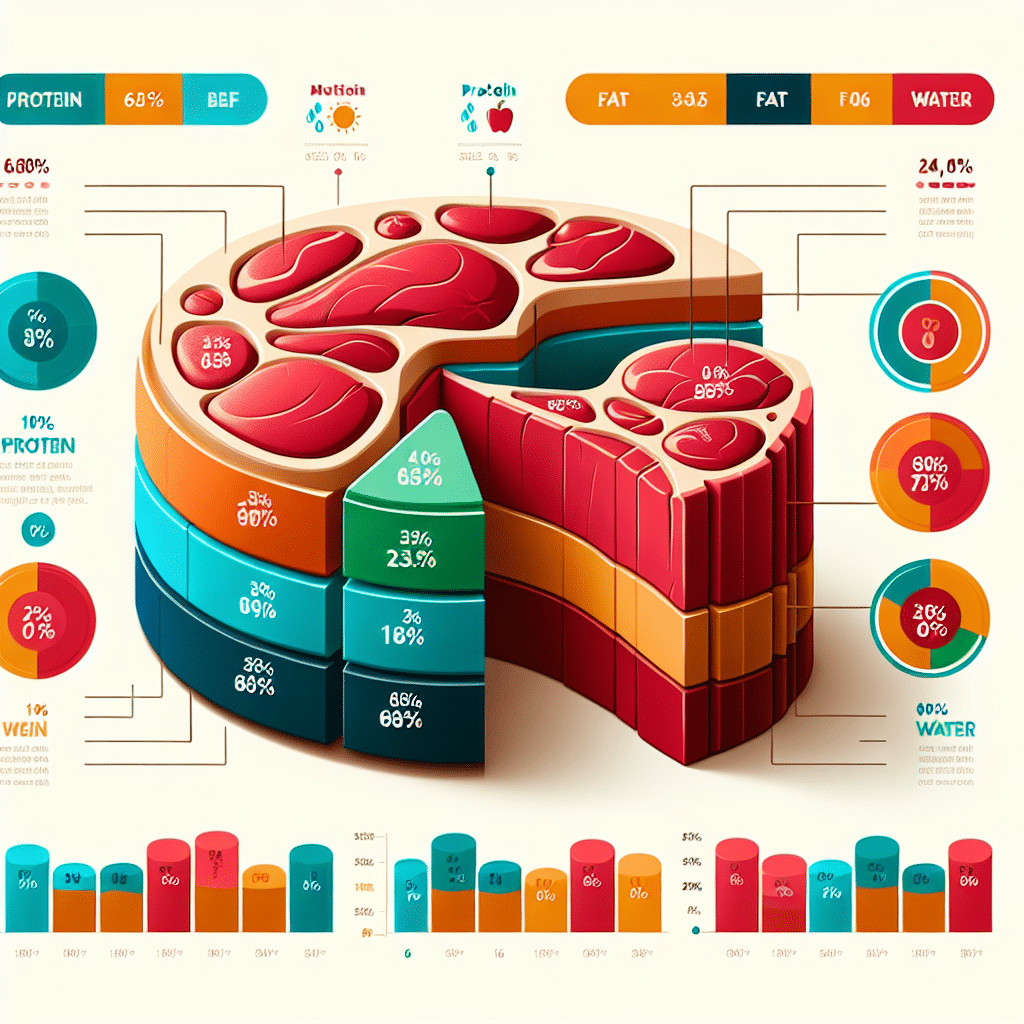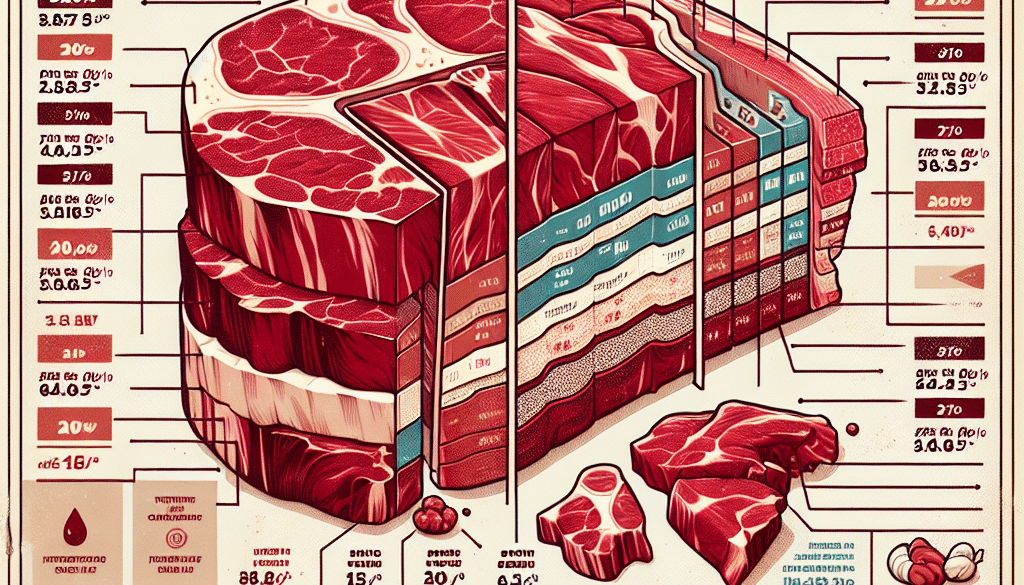Beef Protein Breakdown: The 6 oz Guide
-
Table of Contents
- Beef Protein Breakdown: A Comprehensive 6 oz Guide
- Understanding Beef Protein Content
- Nutritional Profile of a 6 oz Serving of Beef
- Health Benefits of Beef Protein
- Beef Protein vs. Other Protein Sources
- Choosing the Right Cut of Beef
- Preparing Beef for Optimal Protein Retention
- Incorporating Beef into a Balanced Diet
- Conclusion: The Role of Beef in Your Protein Strategy
- Discover ETprotein’s Plant-Based Protein Alternatives
Beef Protein Breakdown: A Comprehensive 6 oz Guide

When it comes to protein sources, beef is often a go-to choice for many fitness enthusiasts, bodybuilders, and those looking to maintain a healthy diet. Understanding the nutritional value and benefits of a 6 oz serving of beef can help you make informed decisions about your protein intake. This article delves into the breakdown of beef protein, its benefits, and how it compares to other protein sources.
Understanding Beef Protein Content
Beef is a high-quality protein source that contains all nine essential amino acids required for the human body’s growth and maintenance. A 6 oz portion of cooked lean beef typically provides about 42-54 grams of protein, depending on the cut and cooking method. This amount of protein is substantial, considering the daily recommended intake is 56 grams for the average sedentary man and 46 grams for the average sedentary woman.
Nutritional Profile of a 6 oz Serving of Beef
A 6 oz serving of beef is not only rich in protein but also packs various nutrients that are beneficial for health. Here’s a breakdown of what you can expect from this portion size:
- Iron: Essential for transporting oxygen in the blood.
- Zinc: Supports immune function and wound healing.
- B Vitamins: Including B12, niacin, and riboflavin, which help convert food into energy.
- Creatine: Aids in muscle growth and energy production during exercise.
- Conjugated Linoleic Acid (CLA): A fatty acid that may have health benefits.
It’s important to note that the fat content can vary, with leaner cuts offering less fat and fewer calories.
Health Benefits of Beef Protein
Beef protein is not only a building block for muscle mass but also has several health benefits:
- Supports Muscle Repair and Growth: The rich amino acid profile helps in the repair and growth of muscle tissue, especially after exercise.
- Boosts Iron Absorption: The heme iron in beef is more easily absorbed by the body compared to non-heme iron found in plant sources.
- Improves Overall Nutrition: The additional nutrients found in beef contribute to a well-rounded diet.
Beef Protein vs. Other Protein Sources
When comparing beef to other protein sources, it’s important to consider the complete nutritional profile:
- Plant-Based Proteins: While they are lower in saturated fats and calories, they may not always provide all essential amino acids unless combined properly.
- Poultry and Fish: These are leaner protein sources but may have less iron and B vitamins than beef.
- Dairy and Eggs: They offer high-quality protein but can be higher in cholesterol and saturated fat.
Choosing the right protein source depends on dietary preferences, health goals, and nutritional needs.
Choosing the Right Cut of Beef
Selecting the right cut of beef is crucial for balancing protein intake with fat and calorie consumption:
- Lean Cuts: Options like sirloin, tenderloin, and extra-lean ground beef are lower in fat.
- Marbled Cuts: Ribeye and T-bone steaks have more fat, which can contribute to flavor but also increase calorie count.
Opting for grass-fed beef can also provide higher levels of omega-3 fatty acids and CLA.
Preparing Beef for Optimal Protein Retention
Cooking methods can affect the protein content and nutritional value of beef:
- Grilling and Broiling: These methods can reduce fat content while preserving protein.
- Slow Cooking: Helps tenderize tougher cuts without losing nutrients.
- Avoid Overcooking: Overcooking can lead to a loss of moisture and potential reduction in protein quality.
Marinating beef can also add flavor and potentially reduce the formation of harmful compounds during cooking.
Incorporating Beef into a Balanced Diet
While beef is a nutritious protein source, it’s important to consume it as part of a balanced diet that includes a variety of foods:
- Pair beef with vegetables and whole grains for a well-rounded meal.
- Limit intake of processed and high-fat cuts of beef to manage calorie and saturated fat consumption.
- Consider portion control to maintain a healthy weight and prevent overconsumption of protein.
Conclusion: The Role of Beef in Your Protein Strategy
Beef protein is a powerful component of a nutritious diet, offering a rich source of essential amino acids and other vital nutrients. A 6 oz serving of beef can significantly contribute to your daily protein needs while providing additional health benefits. However, it’s essential to choose the right cuts, cooking methods, and incorporate beef into a balanced diet to maximize its advantages.
Discover ETprotein’s Plant-Based Protein Alternatives
If you’re looking for plant-based protein alternatives to beef, ETprotein offers a range of high-quality vegan protein products. Their selection includes organic rice protein, pea protein, and various seed proteins, all characterized by a neutral taste and non-GMO, allergen-free attributes. ETprotein caters to a diverse range of industries, ensuring that you have access to the best plant proteins for your dietary needs.
About ETprotein:
ETprotein, a reputable plant protein vegan protein Chinese factory manufacturer and supplier, is renowned for producing, stocking, exporting, and delivering the highest quality organic bulk vegan protein and plant proteins. They include Organic rice protein, clear rice protein, pea protein, clear pea protein, watermelon seed protein, pumpkin seed protein, sunflower seed protein, mung bean protein, peanut protein etc. Their offerings, characterized by a neutral taste, non-GMO, allergen-free attributes, cater to a diverse range of industries. They serve nutraceutical, pharmaceutical, cosmeceutical, veterinary, as well as food and beverage finished product distributors, traders, and manufacturers across Europe, USA, Canada, Australia, Thailand, Japan, Korea, Brazil, and Chile, among others.
ETprotein specialization includes exporting and delivering tailor-made protein powder and finished nutritional supplements. Their extensive product range covers sectors like Food and Beverage, Sports Nutrition, Weight Management, Dietary Supplements, Health and Wellness Products, and Infant Formula, ensuring comprehensive solutions to meet all your protein needs.
As a trusted company by leading global food and beverage brands and Fortune 500 companies, ETprotein reinforces China’s reputation in the global arena. For more information or to sample their products, please contact them and email sales(at)ETprotein.com today.












